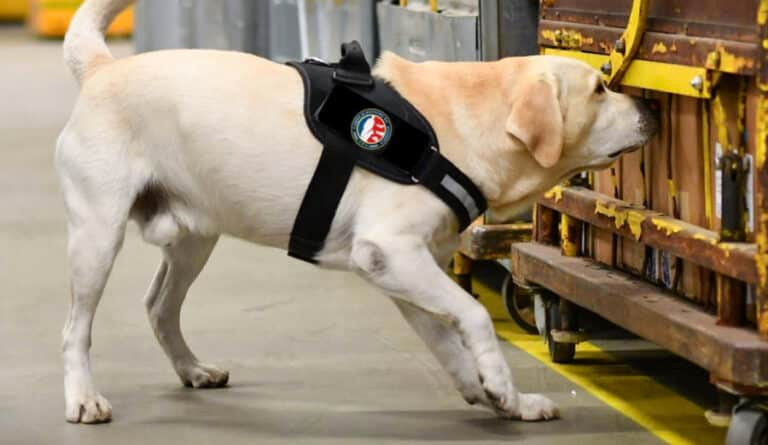When the Transportation Security Administration’s Certified Cargo Screening Program Canine (CCSP-K9) was established, it was clear that no one supplier could supply enough sniffer dogs, so the Cargo Screening K9 Alliance (CSK9) is bringing together the best of the breeds in the canine industry.
TSA canine resources are primarily used for passenger screening, it was clear there would not be enough for screening cargo so airlines were allowed airlines and freight forwarders to use Third Party K9 Cargo (3PK9-C) certified explosive detection canine teams (EDCT) as a primarily screening method.
Under the umbrella of ITC Capital Partners, the limited liability company consists of Vapor Wake K9, Vohne Liche Kennels, Southern Coast K9 and K9 Employment, and has four regional hubs representing the North East, South East, South Central and West of the US.
Vapor Wake K9 president, Paul Hammond tells Air Cargo Week it was clear that no one company could provide enough dogs or handlers at any one time.
He explains: “The TSA arranged meetings to discuss with other canine providers in the industry. We saw an estimate saying there were a thousand dogs, and a high estimate of 2,000 teams.”
There were concerns about the amount who would be ready when needed, Hammond comments: “Canines are in high demand, the whole nation has a shortage of handlers. We have to find them to team with the canines in the period of time we need them.”
It was clear that no one company could cope on their own, so an alliance of experts would be required, bringing with them different areas of expertise and ensuring they have a wide coverage across the US.
Founder and managing partner of CSK9, Vapor Wake operates a 320-acre training academy in Anniston, Alabama and is the south-central hub of the alliance.
Denver, Indiana-headquartered Vohne Liche is strategically located as the North Region hub to provide support for major international cargo hubs and also operates facilities in Banning, California and in the Netherlands.
Southern Coast K9 has a training centre in New Smyrna Beach, Florida and offers several areas for training. K9 Employment provides recruitment services, giving the alliance access to thousands of handlers with military or police experience.
Hammond says: “The alliance has coverage with regional hubs with very large training academies. We have the ability to mobilise quickly.”
The alliance has a Dutch-based kennel to get the best European working dog stock, allowing CSK9 to sniff out the best canines. Breeds including German Shepherds, Spaniels and Labrador Retrievers are best due to their intelligence, temperament and hunt drive. For the dog, search a box or ULD or shipping container is a game of search.
Hammond says: “If they thought they were looking for a bomb then they probably wouldn’t want to do it!”
The dogs need to be intelligent and robust to cope with the noises and distractions of working in a cargo warehouse. K9 has a $20,000 PA system to play sounds such as forklift truck and aircraft taking off and landing to get the dogs used to the sounds of the airport warehouse. “It is very important to prepare them for site operations” Hammond says.
Training the dog usually takes between eight and 12 weeks, depending on the individual animal, with another four to eight weeks for the handler. Working with canines in cargo gives handlers a career once they have left the military.
A dog’s sense of smell is 40 times more sensitive than a human’s, and Hammond was involved in a Pentagon study evaluating detection technology. Canines were able to detect at least 85 per cent of threats while the nearest technology managed around 50 per cent.
Hammond believes the canines are “great for the industry”, and that airlines and freight forwarders understand that it is a “win-win situation”.
The dog teams can significantly speed up search and scanning cargo. It can take a team of three to six workers between six and nine minutes to unwrap a pallet, put the cargo through an x-ray machine and put it back together.
Hammond says: “A canine team is able to do the job without unwrapping the cargo in about 30 seconds. The time and cost savings are huge.”




